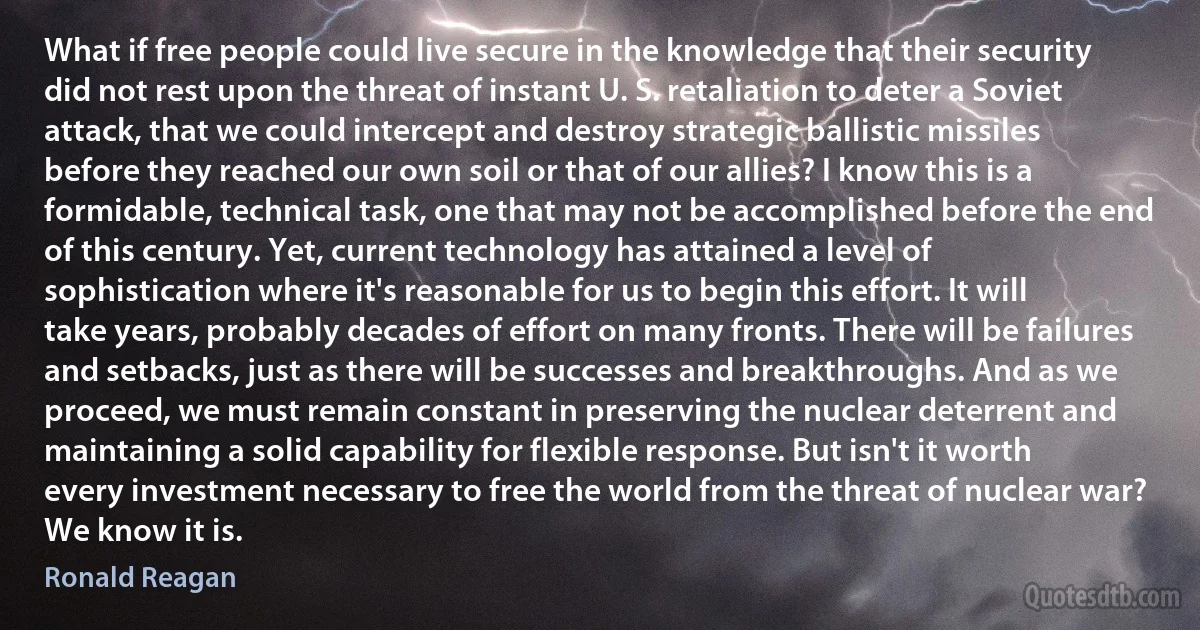
What if free people could live secure in the knowledge that their security did not rest upon the threat of instant U. S. retaliation to deter a Soviet attack, that we could intercept and destroy strategic ballistic missiles before they reached our own soil or that of our allies? I know this is a formidable, technical task, one that may not be accomplished before the end of this century. Yet, current technology has attained a level of sophistication where it's reasonable for us to begin this effort. It will take years, probably decades of effort on many fronts. There will be failures and setbacks, just as there will be successes and breakthroughs. And as we proceed, we must remain constant in preserving the nuclear deterrent and maintaining a solid capability for flexible response. But isn't it worth every investment necessary to free the world from the threat of nuclear war? We know it is.
Ronald ReaganRelated topics
allies attack begin century constant effort end free intercept knowledge live maintaining necessary nuclear people proceed remain rest security soil sophistication take task technical technology war world worth yet yearsRelated quotes
All racist and anti-semitic attacks must be stamped out. However, the reality is that the great bulk of racist attacks in Europe today are on black people, Asians and Muslims - and they are the primary targets of the extreme right. For 20 years Israeli governments have attempted to portray anyone who forcefully criticises the policies of Israel as anti-semitic. The truth is the opposite: the same universal human values that recognise the Holocaust as the greatest racist crime of the 20th century require condemnation of the policies of successive Israeli governments - not on the absurd grounds that they are Nazi or equivalent to the Holocaust, but because ethnic cleansing, discrimination and terror are immoral.
They are also fuelling anger and violence across the world. For a mayor of London not to speak out against such injustice would not only be wrong - but would also ignore the threat it poses to the security of all Londoners.

Ken Livingstone
[T]he nature of the new world system was not so different from the old. It was for the moment more stable, but a reasonable forecast would be that Africa in particular had a century of border wars ahead of it. On the other hand, such was the power of the anticolonial idea that great powers from outside a region had relatively little influence unless they were prepared to use force. China altogether backed Fretilin in Timor, and lost. In Spanish Sahara, Russia just as completely backed Algeria, and its front, known as Polisario, and lost. In both instances the United States wished things to turn out as they did, and worked to bring this about. The Department of State desired that the United Nations prove utterly ineffective in whatever measures it undertook. This task was given to me, and I carried it forward with not inconsiderable success.

Daniel Patrick Moynihan
Germany agreed to restrict her Navy to one third the size of the British but was accorded the right to build submarines, explicitly denied her by the peace treaty, up to 60 percent of British strength, and to 100 percent in case she decided it was necessary to her security, which she shortly did. Germany also pledged that her U-boats would never attack unarmed merchant ships, a word that she went back on from the very beginning of the second war. As soon as the deal with Britain was concluded Germany laid down two battleships, the Bismarck and Tirpitz, with a displacement of over 45,000 tons. By the terms of the Washington and London naval accords, Britain, France, Italy, Japan, and the United States had to limit their battleships to 35,000 tons. Great Britain, as the French contended, had no legal right to absolve Germany from respecting the naval clauses of the Versailles Treaty. And, as many Frenchmen added, no moral right either.

William L. Shirer
Well alright, anyone who has dreams of world empire, look what it did to Britain (chuckles heartily). There's a reason that whole country is one big Smith song. That's actually one exciting thing about studying history, there did come a point towards the end of the 19th century where the British were just like, "this ain't worth it mate". There's a reason why in 1945 they gave us the keys to the world. They were like, "here, it's yours, take it, go, we're fine, no? India, go. Africa, go." Because they'd had enough. Because it's really hard, we can't even run ourselves. We literally have people storming our capital with signs saying, "government, keep your hands off my social security". If we can't handle that, do we really want to try and run, Africa? I think what we need is not so much world empire, I think we need closer cooperation, closer alliances.

Max Brooks
Our presence will serve as an incentive for al Qaeda to grow in numbers and motivate more suicide bombers. An indefinite presence, whether in Iraq, Afghanistan, or Pakistan, will continue to drain our financial resources, undermine our national defense, demoralize our military and exacerbate our financial crisis. All this will be welcomed by Osama Bin Laden, just as he planned it. It's actually more than he had hoped for. [...] The war in Afghanistan and Pakistan will be much bigger, unless the dollar follows the path of the dollar-based world financial system and collapses into runaway inflation. In this case, the laws of economics and the realities of history will prove superior to the madness of maintaining a world empire financed by scraps of paper. Our military prowess, backed by a nuclear arsenal, will not suffice in overcoming the tragedy of a currency crisis. Soviet nukes did not preserve its empire or the communist economy.

Ron Paul
